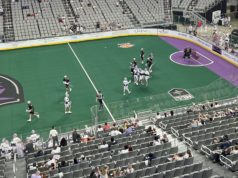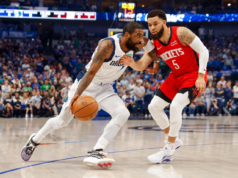After an epic destruction of Brazil in the semis and a hard-fought win over Argentina in the finals, Germany are now the world champions of soccer. It’s been a 24 year wait for them, proof that the World Cup is a huge mountain to climb even for the sport’s superpowers. Let’s wrap things up with a final batch of questions.
You could see this coming, right?
Since World Cup 2006, when the Germans under then-Coach Jürgen Klinsmann reinvented themselves as an up-tempo attacking unit, they’ve been a team on the rise. Before he arrived, Germany were playing turgid, hard-to-watch soccer, and while they reached the finals of World Cup 2002, they were terrible at Euro 2000 and 2004. This current Germany team has looked different from previous German winners, and not just because they have non-white players (Jérôme Boateng, Mesut Özil, and poor Sami Khedira, who all made huge contributions in this tournament). They’ve never had the collection of technically gifted attacking players that they have now in Özil, Toni Kroos, Thomas Müller, André Schürrle, and Mario Götze, who just ensured that he’ll never have to pay for another drink in Germany in his life. This World Cup win arrives just as the honeymoon phase was ending and people in Germany were starting to ask why the team hadn’t won anything, for all their fancy football. After being denied by Spain’s golden generation in Euro 2008 and World Cup 2010, die Mannschaft have finally reached the top.
So Klinsmann deserves some credit for the Germans winning?
A share. Klinsmann recognized that the Germans no longer had the rock-solid defense needed to play that way, so he focused on offense, bringing in new standards of fitness and nutrition as well as a team psychologist at a time when European sports teams considered that to be a weird American practice. He also brought in Joachim Löw as his assistant coach, and Löw took over after Klinsmann moved on. It takes nothing away from Löw’s magnificent management in this tournament to say that he was a peripheral figure in German soccer before Klinsmann brought him into the national team. He probably couldn’t have coached Germany to this win himself (he’s a polarizing figure among Germany’s current players), but this win probably doesn’t happen without his influence.
Who else is an unsung hero for Germany?
Josep Guardiola. The current coach of Bayern Munich, the Catalan is in charge of seven key players for Germany (Boateng, Kroos, Müller, Götze, Philipp Lahm, Manuel Neuer, and Bastian Schweinsteiger). He brought his tiki-taka philosophy of keeping possession of the ball as both a defensive and offensive strategy to Bayern, and his players were able to use that for Germany while melding that to an incisiveness that the Spaniards lacked. Before coaching Bayern, Guardiola had been at Barcelona, where he won every trophy in sight (before resigning to spend a year drinking lattés in New York and recharging) and installed that same philosophy into the players who formed the spine of the Spain team that won the three major tournaments before this one. For a guy who stayed far away from the World Cup, Guardiola has cast a long shadow.
Miroslav Klose has now scored more World Cup goals than any other player in history. Why haven’t I heard of him?
The big Polish-born striker has never been in the conversation when it comes to the world’s best, and yet he’s now ahead of all-time greats. His combination of power and speed has somehow never translated into overwhelming form at the various clubs he has played for, but he has always meshed well with the German national setup, and he has always had outstanding off-the-ball movement, which has been particularly important as his legs have gone. (You could see this when he tried to celebrate his goal against Ghana by turning his trademark forward flip, and he couldn’t stick the landing.) He may not have ever been spectacular, but slow and steady tends to win a race like this, and his enviable career in a Germany shirt has now been capped with the sport’s biggest prize.
Who is ahead of FIFA when it comes to treating concussions?
In no particular order, the NFL, the NBA, Major League Baseball, the NHL, rugby, every branch of the U.S. military, and (I can only hope) your kid’s high school. Argentina’s Javier Mascherano went down like a knocked-out boxer against Netherlands but stayed in the game after regaining consciousness, while Germany belatedly but eventually did the right thing when they pulled starter Christoph Kramer after 30 minutes, as the player looked like he no longer knew the answer to “What is four plus seven?” The fact that the Germans won anyway despite burning a substitution will probably inspire other coaches to do the same to protect their players’ health. Nevertheless, FIFA needs to change its rules so that teams aren’t forced to use up a valuable substitution because one of their players suffers a concussion. Rugby union’s rules on this seem like a pretty good compromise.
What is the fallout from Brazil’s massive loss in front of their own fans?
That may take decades to assess. Coach Luiz Felipe Scolari is already reportedly out, as he should be, but the whole soccer federation looks due for a root-and-branch reexamination of everything they do. The injured Neymar will walk away from the disaster unscathed, but it’s hard to see how the other players will recover from this. Brazil’s loss in the 1950 World Cup final on home soil haunted their players for the rest of their lives, and those players didn’t have to deal with Twitter. The loss may well affect President Dilma Rousseff’s chances for re-election this year — the whole stadium in Belo Horizonte was chanting for her to have sex with herself during the loss to Germany, and it wasn’t just frustration over conceding seven goals. The country is having serious buyer’s remorse over the money spent to stage this World Cup when so many people don’t have basic services, and the humiliation of the game’s lopsided result is only adding to it. The Brazilians spent $11 billion on this World Cup, and keep in mind that they brought some of those costs on themselves by building more stadiums than FIFA requested in order to please regional governments. (Political conservatives take note; this is something that can happen when states have too much power.) They still have the 2016 Summer Olympics to stage in Rio, too. The country looks headed for interesting times.
Have these sporting events gotten so big that it’s bad for a country’s economy to stage them?
People are starting to get that idea, judging by the tepid bidding for the 2022 Winter Olympics. It would be more cost-effective to confine these events to rich nations like ours, where facilities are already in place, but I’m not sure it’s a good idea to keep Olympics and World Cups out of smaller countries. Then again, we seem headed to where such events are given to dictatorships that can spend billions and build new facilities quickly without answering to voters. I like this even less.
What was the deal with the Dutch goalkeepers in penalty shootouts?
Coach Louis van Gaal had a stroke of genius changing out his goalkeepers for the shootout against Costa Rica. Backup Tim Krul isn’t that much better than first-choice Jasper Cillessen when it comes to stopping penalties, but the unprecedented move took all the focus off Netherlands’ players. This was important because, historically, the Dutch team has been terrible at winning shootouts. Van Gaal’s change meant that had the Dutch lost again, the heat would have fallen on him, not the players. Since van Gaal was already slated to leave the Netherlands job for Manchester United in a few months, he was in perfect position to say, “Screw it! Let’s try this!” The trouble is that he couldn’t pull the same trick against Argentina in the semis because of the way the game broke. He had to leave Cillessen in, and the starting keeper’s confidence looked shot. Cillessen may not recover from the experience, but it’s not van Gaal’s problem if he doesn’t.
What were the best goals of the World Cup?
10) Jermaine Jones (USA) against Portugal.
9) Giovani dos Santos (Mexico) against Netherlands.
8) André Schürrle (Germany) against Brazil.
http://youtu.be/LhHFn6o-MBc
7) Xherdan Shaqiri (Switzerland) against Honduras.
http://youtu.be/X8sHuwPJP0U
6) David Luiz (Brazil) against Colombia.
5) Mario Götze (Germany) against Argentina.
4) Lionel Messi (Argentina) against Nigeria.
3) James Rodríguez (Colombia) against Uruguay.
2) Tim Cahill (Australia) against Netherlands.
1) Robin van Persie (Netherlands) against Spain.
What were the best goalkeeper saves of the World Cup?
7) Sérgio Romero (Argentina) against Netherlands, denying Wesley Sneijder in the penalty shootout.
6) Tim Howard (USA) against Belgium, kick-saving Kevin Mirallas’ one-on-one chance.
http://youtu.be/xRV1hZ0eCas?t=1m11s
5) Guillermo Ochoa (Mexico) against Netherlands, deflecting Stefan de Vrij’s point-blank shot against the post.
http://youtu.be/GEvZpmEA9z8
4) Manuel Neuer (Germany) against Brazil, pulling a double save on Paulinho. \
3) Howard against Portugal, recovering to deny Éder’s follow-up attempt.
2) Keylor Navas (Costa Rica) against Uruguay, tipping Diego Forlán’s deflected effort over the bar.
1) Ochoa against Brazil, stopping Neymar.
Non-goalkeeper honorable mention) Yeltsin Tejeda (Costa Rica) against Netherlands, blocking Robin van Persie’s follow-up shot.
http://youtu.be/Mdkwrf8uvIU
Who is in your team of the World Cup?
GK: Keylor Navas (Costa Rica)
CB: Mats Hummels (Germany)
CB: Stefan de Vrij (Netherlands)
LB: Philipp Lahm (Germany)
RB: Serge Aurier (Ivory Coast)
MF: Javier Mascherano (Argentina)
MF: Thomas Müller (Germany)
MF: James Rodríguez (Colombia)
FW: Arjen Robben (Netherlands)
FW: Lionel Messi (Argentina)
FW: Neymar (Brazil)
Bench: Tim Howard (USA), Ron Vlaar (Netherlands), Jérôme Boateng (Germany), Ezequiel Garay (Argentina), Ricardo Rodríguez (Switzerland), Muhamed Bešić (Bosnia-Herzegovina), Juan Cuadrado (Colombia), Mathieu Valbuena (France), Xherdan Shaqiri (Switzerland), Toni Kroos (Germany), Alexis Sánchez (Chile), Enner Valencia (Ecuador), Manuel Neuer (Germany).
What else will you remember from this year’s tournament?
Costa Rica going toe-to-toe with the big boys, Spain and then Brazil melting down, the Colombians dancing to celebrate their goals, Arjen Robben being brilliant when he wasn’t diving, Messi’s late-game exploits against Iran and Nigeria, Manuel Neuer taking a page from Martin Brodeur’s playbook and playing way out of his net, Ochoa and Howard fending off barrages in their nets, and even that wrestling heel Luis Suárez. They all inspired me during this past month. My thanks to the soccer world for that, and to you for reading. I’ll see you all at next year’s Women’s World Cup.













Excellent article wrapping up a wonderful World Cup!
I’mnot sure why bbut this web site is loading incredibly slow
for me. Is anyone else having this issue or is it a issue on my
end? I’ll check back later and see if the problem still exists.